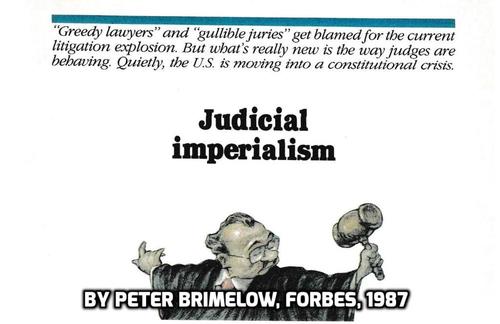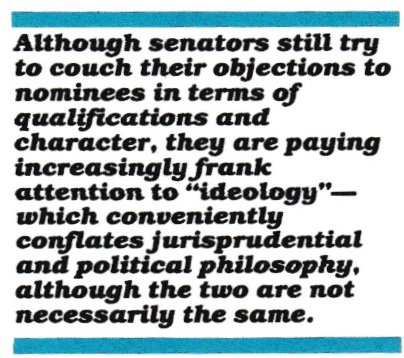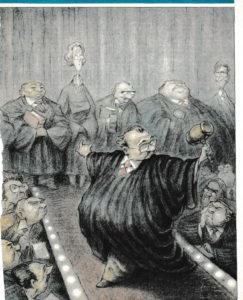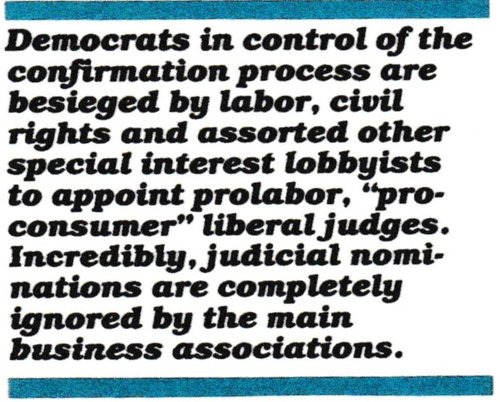
02/10/2017
See also John Derbyshire: Why Our So-Called Judges Should Get TWICE As Much Criticism As Politicians
By VDARE.com Editor Peter Brimelow writes: I don’t totally agree with the cynicism about the judicial branch that John Derbyshire expresses, after the Ninth Circuit’s mugging of Trump’s immigration patriot Executive Order, on Radio Derb tonight. Or, more accurately, I think he’s really reacting to increasingly lawless behavior by Leftist judges especially since Brown vs. Board in 1954. I may humbly say I’ve been predicting this development at least since my Harper’s Magazine article on the subject in 1981. We reproduce here a Forbes cover story that I persuaded the magazine’s late, great Editor Jim Michaels to run in 1987 — ironically, just weeks before the unprecedented character assassination of Reagan Supreme Court nominee Robert Bork revealed the Left was fully aware that what was at stake was not law, but brute political power. Derbyshire’s reaction, and that of others (here, here, here), shows that this awareness has now spread across the political spectrum. Paradoxically, legislating judges depend on a public respect for the law which their own arbitrary decrees ultimately destroy. It’s taken longer than I thought (as usual). But it’s happened. And it’s another aspect of America’s inexorable slide into Civil War II.
"Greedy lawyers" and “gullible juries" get blamed for the current litigation explosion. But what’s really new is the way judges are behaving. Quietly, the U.S is moving into a constitutional crisis.
Judicial Imperialism, Forbes, June 1, 1987,

EXACTLY 200 years ago, in May 1787, some 55 delegates from 12 of the 13 original states met in Philadelphia to begin the convention that was to draft the U.S. Constitution. They came together largely because of fears about what was ahead for business — interstate conflicts were threatening economic disruption.
The convention succeeded. It established a framework of law and institutions within which the American economy had the freedom to achieve its epochal expansion. But the balance among the executive, legislative and judicial branches of the government has never been quite stable. The latest development, gathering momentum since the 1950s: an imperial judiciary — the assertion by federal and state judges of increasing power over wider areas of national life.
Judicial imperialism goes largely un-criticized because it has made possible many popular liberal reforms without any of the acts of Congress, constitutional amendments and other tiresome democratic details that would normally have been required. And it is applauded by academics at elite law schools: Most are so-called noninterpretivists, who argue that judges should not be constrained by the mere letter of the law but instead should implement "higher values" (i.e., those favored by academics at elite law schools). But by substituting judges' personal values for the law, judicial imperialism is creating a dangerously uncertain legal environment for American business. And it is provoking a litigation explosion — of which Texaco is a recent and particularly spectacular victim.
A spring day in Washington, and the cherry trees are in blossom. So is Senator Patrick J. Leahy (D–Vt.). He is chairing the Senate Judiciary Committee’s hearing into federal judge David B. Sentelle's nomination to the D.C. Circuit Court, and is charmingly telling Sentelle’s family, in attendance, not to miss the display.

Abruptly, astonishingly, the seasons go into reverse. A suddenly wintry Leahy demands to know if Sentelle belongs to any discriminatory group. Sentelle says he is a Mason and that Masons do not admit women. Leahy then reads icily from a reference book that says Masons also exclude blacks. When Sentelle protests that there are black Masons, Leahy quotes a further passage saying that black Masonic lodges are strictly unofficial. Sentelle agrees to see if his lodge has any policy against admitting blacks. And then Leahy is all flowers again, his questions for the session over. Because it hears many cases filed against federal regulatory agencies, the D.C. Circuit Court is often described as the second-most-important court in the country. That Leahy’s questions did not focus on legal issues might seem surprising — or worse, given that Senator Robert Byrd (D–W.Va.) and Representative James Wright (D–Tex.), the present majority leaders in the Senate and the House, are both Masons, as were eight of the nine Supreme Court justices who signed the 1954 Brown v. Board of Education decision outlawing school segregation. But liberals like Leahy, searching for ways to oppose President Reagan’s nominations, know it’s hard to pillory someone because he thinks judges should stick to the law rather than to "higher values," whereas in contemporary politics any hint of racism is a live rail issue, sudden death to anyone maneuvered into contact with it. Reagan nominees have found their private conversations and even jokes resurrected by hearsay years later.

By early May David Sentelle’s nomination had been reported out of committee, although the American Bar Association had been asked to rule on the propriety of Masonic membership. Of Reagan’s judicial nominees, 21 are now waiting for confirmation by the Democratic-controlled Senate. So far this year just 10 have been allowed through.
The Senate’s traditional nonpartisan pose toward judicial nominations is showing strain. Although senators still try to couch their objections to nominees as much as possible in terms of qualifications and character, they are paying increasingly frank attention to "ideology" — which conveniently conflates jurisprudential and political philosophy, although the two are not necessarily the same. A good judge is supposed to be able to subordinate his political beliefs to the demands of the law. That’s why in 1979 Senator Joseph Biden (D–Del.), a presidential hopeful and member of the Judiciary Committee, denounced the idea that then Illinois Representative Abner Mikva’s liberal activist political record meant he could not be an impartial D.C. Circuit Court judge. But in 1986 Biden told Reagan nominee Daniel A. Manion that he would vote against his confirmation to the Seventh Circuit Appeals Court precisely because of Manion’s conservative politics.
This politicization is the inexorable result of more than three decades in which virtually every major social reform has come not from legislatures but from the bench. For example, courts have limited capital punishment, ended school prayer, caused one-man, one-vote state legislative reapportionment, allowed abortion on demand, and watered down residency laws for welfare eligibility — all by "discovering" them in the Constitution. Not one of these basic changes was actually voted into law by elected legislators.
The courts are often said to follow the election returns. But modern judicial imperialists actually anticipate the electorate — indeed, as in the case of busing, often ignore it. Their liberal activism is often said to be the mirror image of the period of so-called conservative activism earlier in this century. Then, the Supreme Court systematically struck down attempts by politicians to regulate the economy despite Oliver Wendell Holmes Jr.’s quip, in his famous Lochner dissent, that the Constitution "does not enact Mr. Herbert Spencer’s Social Statics" — classical, free market liberalism. Eventually, this laissez-faire doctrine precipitated a constitutional crisis in which Roosevelt attempted to pack the Court with his supporters. This earlier judicial "activism," however, had only consisted of reviewing the actions of reforming legislatures. Nowadays, modern activism itself originates reforms.
Business people often do not recognize the effect judicial imperialism has had on their own affairs. They tend to blame Texaco-style atrocities on ignorant juries and greedy lawyers, forgetting that judges control courtrooms and that appeals are heard by judges alone. Thus:
The Reagan Administration has an official antidote to judicial imperialism. Attorney General Edwin Meese has repeatedly called for a return to an impartial law — to a "jurisprudence of original meaning," a.k.a. "original intent" or "interpretivism." He wants to revive the idea that laws should be construed according to their plain meaning, illuminated where necessary by the debate surrounding their enactment.
The Administration’s screening of nominees' legal philosophies is unquestionably intense. But officials bitterly resent the canard that they are just looking for judges who will be activists for conservatism. They say that impartial law by no means guarantees results that conservatives will enjoy. Thus Justice Antonin Scalia, President Reagan’s Supreme Court appointee, concurred in the majority decision in CTS Corp. v. Dynamics Corp. of America upholding an Indiana anti-takeover statute with the comment that "a law can be both economic folly and constitutional." In a parallel instance, Solicitor General Charles Fried has filed a brief supporting the Communications Workers of America in a union dues case where it appears to be required by what another Reagan official calls "a lousy statute," despite being fiercely attacked by conservative politicians.
Reaganism has already reached the bench. In his six years in office, President Reagan has appointed some 40% of the 741 federal judges; his total may eventually reach half. (However, he may not get to appoint another Supreme Court justice: The present incumbents appear determined to outlast him, although three of the activist bloc and the one swing vote will be over 80 when Reagan’s term ends, and two are already in poor health.)
This tally of judges is not unprecedented. President Jimmy Carter appointed 39% of the bench in four years, counting new posts created by the 1978 Omnibus Judgeship Act. Nor, according to a survey by University of Massachusetts Professor Sheldon Goldman in the April-May issue of Judicature magazine, are Reagan’s judges much different in formal qualifications than his predecessors'. None of Reagan’s choices has actually been rated "unqualified" by the American Bar Association. Three of Carter’s were. Nor, as yet, have any been indicted and/or impeached (Carter: two). Even the controversial Seventh Circuit Appeals Court nominee Daniel Manion, who submitted sample briefs containing misspellings, was found "qualified" by the ABA.
Qualifications aside, several studies have shown the Reagan judges are significantly more likely to support the "conservative" side in a variety of areas than Carter or Nixon appointees. For example, Professors C.K. Rowland, Robert A. Carp and Bridget Todd reported in a recent paper that Reaganites were less than half as likely to support civil rights claims as Carter choices, and only slightly more sympathetic to labor claims.
Moreover, the same studies show that the Carter appointees leaned at least as far in the other direction. Through direct questioning and the use of racial and gender quotas, Carter officials were able to appoint a re-markably uniform group that shared liberal politics and a willingness to judicialize them — the heady brew once described by Yale Law Professor Alexander Bickel as "legalitarianism" or legal egalitarianism. Stephen J. Markman, the assistant attorney general for legal policy, recalls that one Carter nominee, Henry Pregerson, told the Judiciary Committee that, confronted with a conflict between conscience and the letter of the law, he would rule in favor of the former. He was confirmed anyway.
And Carter appointees are indeed expanding the ambit of activism. One example: In Washington State, Judge Jack Tanner found that paying market-rate wages was inherently discriminatory and that the state government should compensate employees according to the "comparable worth" of work. As the Appeals Court pointed out in reversing, Tanner’s decision meant that the free market was in violation of the 1964 Civil Rights Act.
"Maybe the Constitution doesn’t enact Social Statics," says Markman, "but it sure didn’t enact Dewey’s Liberalism either."
Still, Reagan has some killer bees of his own. These are members of the "Law and Economics" movement, who tend to agree with their noninterpretivist colleagues that "original intent" is too confining. The "higher values" they would invoke, however, are those of classical liberalism. Some essentially think the Constitution did enact Social Statics. One of their contentions is that many common forms of regulation are prohibited by the Fifth Amendment’s "takings" clause, the issue in a rent control case about to be heard by the Supreme Court. A particularly fierce law and economics exponent, Professor Bernard Siegan, has been nominated to the Ninth Circuit. His confirmation hearings have been delayed, apparently while Democrats read galleys of his forthcoming book — but, typically, will probably turn on heretical thoughts he is alleged to have uttered about the legal issues in Brown.
 "It simply hasn’t come up as an issue. At all. I don’t know what else to tell you," says John Motley, legislative director of the National Federation of Independent Business. "We have no involvement in the issue really," says Quentin Riegel, assistant general counsel of the National Association of Manufacturers. "I haven’t found any bias in the judiciary either for or,against us." Adds Richard Anthony of the Business Round Table: "We have 11 task forces — accounting, antitrust, torts — but none that covers appointments, even as it pertains to their agendas."
"It simply hasn’t come up as an issue. At all. I don’t know what else to tell you," says John Motley, legislative director of the National Federation of Independent Business. "We have no involvement in the issue really," says Quentin Riegel, assistant general counsel of the National Association of Manufacturers. "I haven’t found any bias in the judiciary either for or,against us." Adds Richard Anthony of the Business Round Table: "We have 11 task forces — accounting, antitrust, torts — but none that covers appointments, even as it pertains to their agendas."
With lobbyists like these, business doesn’t need — or anyway certainly can’t make any use of — a sympathetic President.
And liberals would do well to re-member that when judges learn to subvert the law in one direction, they can subvert the law in another. "Our peculiar security," wrote Thomas Jefferson, "is in the possession of a written Constitution. Let us not make it a blank paper by construction."
Peter Brimelow is the editor of VDARE.com. His best-selling book, Alien Nation: Common Sense About America’s Immigration Disaster, is now available in Kindle format.
This is a content archive of VDARE.com, which Letitia James forced off of the Internet using lawfare.